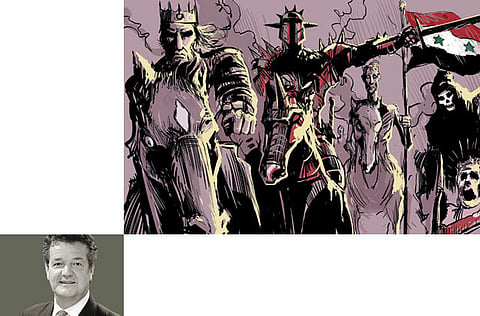Syria is a much greater priority than Iran
Without outside support, nationalist rebels will lose out to Islamists in Syria

It is a problem that people in Washington are spending so much time plotting what to about Iran and avoiding the much more important issue of the collapse of Syria. The situation in Iran can have a rational outcome as experienced governments (even if they have radically opposed word views) should be able to find a way forward. Syria faces unutterable chaos as a multi-faceted civil war rips the country apart, leaving real power with the goons on the streets.
Iran has a coherent government that offers the opportunity for serious debate between its different power centres. It has proved itself very skilled at playing western fears and in more than 30 years, it has not tipped into irrational behaviour — even if it has been happy to use that threat to gain political traction in the region.
Syria is a totally different situation where the country is engulfed by a deeply destabilising civil war with no obvious political end in sight. The dictatorial government has lost its dominant position, but will be hard to defeat. On the other hand, the chaotic opposition still has no coherent political offering, but while its armed forces advance slowly in some areas, it also cannot be stopped by the government.
This recipe for Syrian chaos looks set to continue for the foreseeable future and will suck Syria’s neighbours into the fighting. They will be forced to host armed groups, offer shelter to hundreds of thousands of refugees and, in addition, they will find opportunities to support Syrian rebel groups sympathetic to their ethnic or sectarian position. At least there is an on-going discussion with Iran. The Iranian government met the International Atomic Energy Agency (IAEA) last week, but was unable to come to any agreement, even if there is still talk of a future agreement at some ill-defined time. However, that failure may have been because Iran will meet the P5+1 in Kazakhstan next week, when, as Reuters reported, the West will propose that if Tehran closes down its nuclear site in Fordow, they will lift sanctions on the delivery of precious metals to Iran. This kind of confidence-building measure is what is seen as a first step on the route to a deal which involves Iran proving that it has not got nuclear weapons, and the US insisting that Iran offer full transparency to prove its claim.
This kind of structured dialogue is completely missing from the Syrian crisis. The Qatar conference formed the Syrian National Coalition, headed by Muath Al Khatib, out of the ruins of the Syrian National Council, and several other opposition groups. However, when Al Khatib started to promulgate the possibility of talks with the government — if certain conditions were met, like freeing all women prisoners — it was objected to by large groups within his own organisation. Nor did the government of Bashar Al Assad seem willing to start talks.
The West has been very anxious to interfere in Iran’s affairs, despite the situation being relatively manageable. It is not willing to get involved in Syria because it cannot see an easy end to the fighting and it does not want to be linked to the rambling and chaotic rebel organisations. Many in the region disagree with this refusal to help the rebels.
Help from responsible friends
In January, at the World Economic Forum’s Annual Meeting in Davos, there was an interesting session hosted by Al Arabiya television, when their tough-talking reporter, Rima Maktabi, interrogated Turki Al Faisal Al Saud, the former chief of Saudi intelligence from 1977 to 2001 and the brother of the Saudi Foreign minister, and Ahmet Davutoglu, Turkey’s Foreign Minister, about whether their two countries were arming the rebels.
Prince Turki, who is now Chairman of the King Faisal Centre for Research and Islamic Studies, insisted that as a private citizen, he did not know, but he added that he would be surprised if the Saudi government was not sending arms and supporting the rebels since they needed help. He added that if the rebels did not get help from responsible friends in the region, the moderate and liberal wings of the opposition will lose out to the radical and Islamist wings, to the great detriment of Syria and the region in the long term.
Davutoglu was more specific. When Maktabi asked him thrice if Turkey was helping to arm the rebels, Davutoglu said: “Turkey supports the aspirations of the Syrian people. Turkey’s support for those aspirations is unlimited.” He would not be drawn, though, into a clear yes or no. But it was very clear that the rebels operating out of Turkey were not being harassed by their hosts.
There is a real danger that refusing to get deeply involved with the rebels will lead to far worse chaos than not getting involved. Without help to the rebels and support for a final negotiation, the war looks set to continue for years. It will be tragic if four years’ from now, we were still found debating the rights and wrongs of intervention, while Syria burnt to a cinder. The amount of destruction and misery that will spread through the region will be far worse than helping some groups obtain power that may be inimical to the West.
Sign up for the Daily Briefing
Get the latest news and updates straight to your inbox



